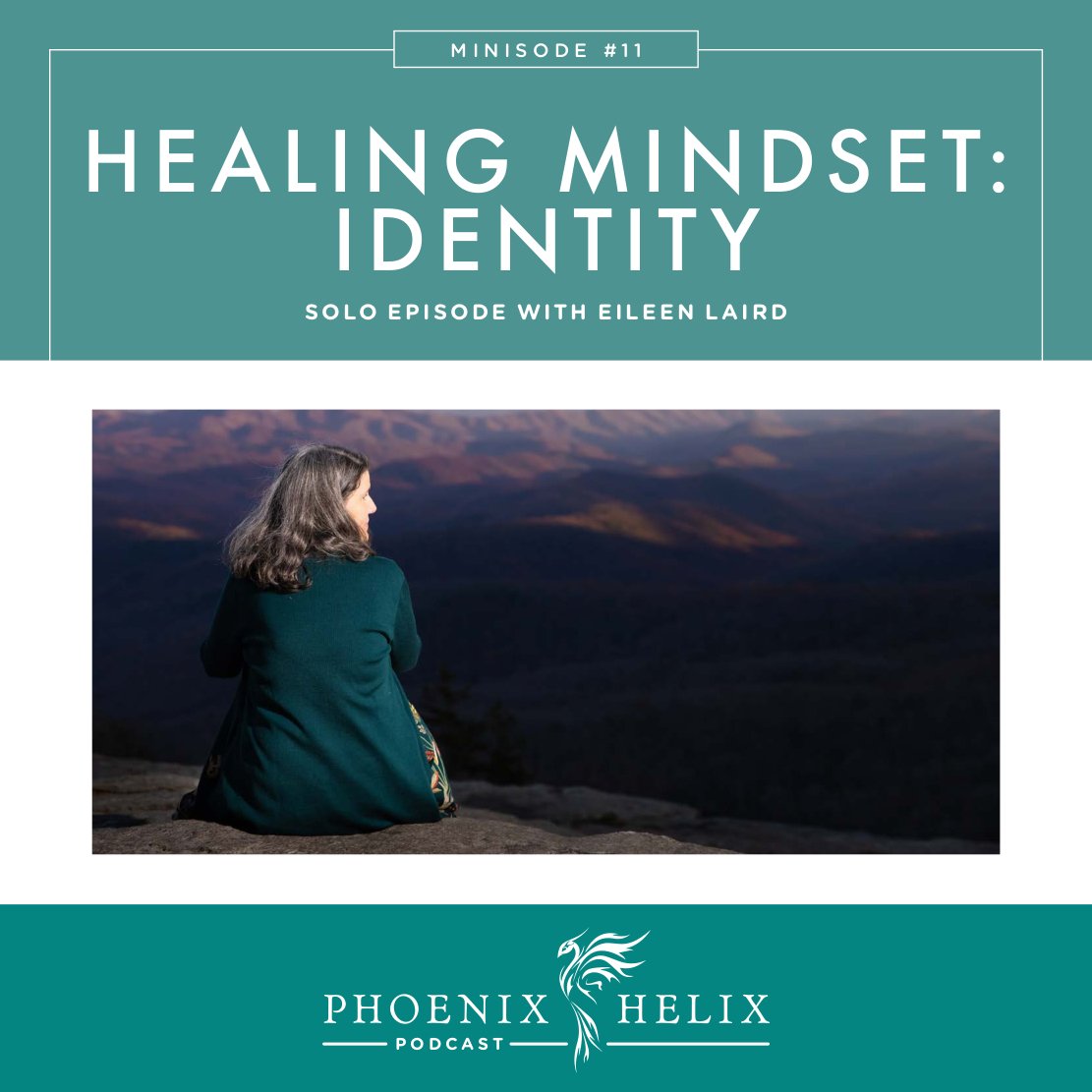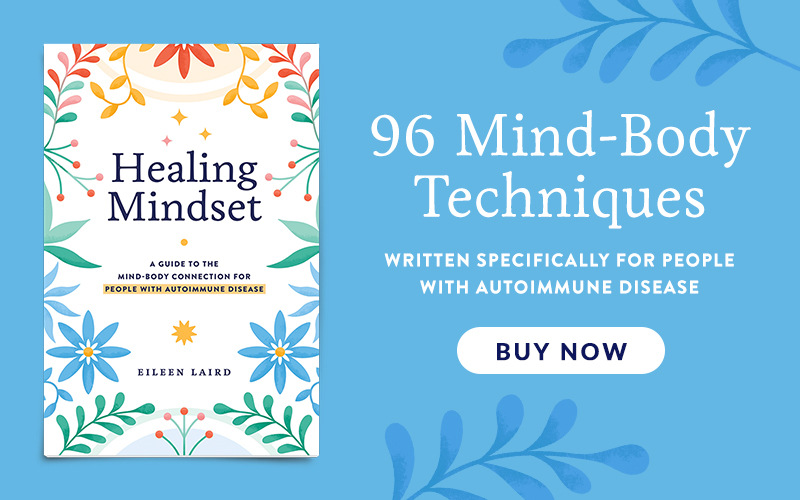What Are Mindset Minisodes?
I’ve been hosting the Phoenix Helix Podcast for over 8 years, and there are now over 200 episodes in the archives! The long-form interviews you know and love will continue every 4 weeks. In between, I’ll be sharing short episodes inspired by my book: Healing Mindset – A Guide to the Mind-Body Connection for People With Autoimmune Disease. Stress is a powerful trigger of inflammation and autoimmune activity, and most of us have experienced stress-induced autoimmune flares. That’s the power of the mind-body connection working against us. However, we can also make the mind-body connection work for us! Simple techniques can help us relieve stress and send an anti-inflammatory cascade through our bodies instead. That’s my goal with these episodes. In each one, I’ll teach a simple technique you can start using right away.
Listen to the Show
- Subscribe to my podcast through your favorite podcast app: iTunes, Google, TuneIn, Spotify, Amazon, etc.
- You can also listen to the episode right here through the player below, and if you subscribe to my newsletter you’ll get notified of future episodes.
Podcast: Play in new window | Download
When Autoimmune Disease Causes an Identity Crisis
The onset of autoimmune disease is a before and after moment for many of us. We feel like a completely different person, not just in our bodies but in our lives. Jobs and interests that were big parts of our identity might no longer be available to us. The roles we play in our families may change. It can feel like we’ve lost who we used to be and we don’t recognize ourselves anymore. It’s a painful and scary time.
Just like there are stages of grief, there are also common stages of an illness identity crisis.
- Stage 1 is Rejection. This is when we pretend we aren’t sick at all, hoping that if we ignore our symptoms they will go away.
- Stage 2 is Engulfment. This happens when our symptoms don’t go away. Instead, they get worse, and we feel like our illness has become our whole identity. It’s all we see, and it can feel like it controls our whole world. It’s natural to feel this, and most of us go through it. It’s important that we don’t get stuck here.
- Stage 3 is Acceptance. Sometimes people misunderstand acceptance. They think it’s giving up when it’s not. Instead, it’s simply understanding that autoimmune disease is part of your life, and there can be grace and relief in that acceptance. It’s the opposite of fighting reality. And when we do that, not only can we see more options for managing our illness well, we can also see that our life is so much more than our illness. Imagine a camera with different lenses. It’s the difference between looking at your life with a zoom lens that focuses solely on your illness vs. a wide angle lens that allows you to see a bigger view. Autoimmune disease is part of who we are, but it’s not all that we are.
- Stage 4 is Enrichment. This is when we grow through the experience, taking something traumatic like autoimmune disease and somehow finding the gifts within it. I recently recorded a podcast (Episode 227) where my guests and I shared our greatest challenge and greatest gift in having autoimmune disease. For all of us, the challenge led to the gift.
- To be clear, just like the stages of grief, these aren’t always linear and they aren’t always complete, but they offer some wisdom on how we can get lost in an illness identity crisis vs. finding our way through it.
Technique: Expand Your Sense of Self
Chapter 22 of my book focuses on this process. I want to share one of the techniques with you today. This practice helps us see that we haven’t lost ourselves completely, even when we feel that we have. Get out your journal or a notebook, and ask yourself the following questions:
- For the qualities you value most in your identity that you feel you’ve lost, can those be expressed in new ways?
- What parts of yourself are still there whether you are ill or not?
If you have trouble answering these questions, ask someone you trust who knows you well and who also knew you before your diagnosis. I remember telling a friend when I was at rock bottom with rheumatoid arthritis that I felt so weak, and I didn’t recognize myself or my body any more. She said, “Eileen, I have never seen you express as much strength as you have since managing this illness.” She helped me see myself more clearly. I hope this technique does the same for you.
My Book: Healing Mindset
You May Also Be Interested In
Spreading the Word
If you like the podcast, please leave a positive review in iTunes. It would mean the world to me, and also helps others find the podcast. Here are some quick instructions using your iPhone:
- If you are already subscribed to my podcast: (1) Click the purple podcast icon. (2) At the bottom of the screen, click Library. (3) At the top of the screen, click Shows. (4) Click the Phoenix Helix podcast image. (5) Scroll down the page, and you’ll see Ratings and Reviews. Scroll down a little bit more and click on Write a Review. This will bring up the review screen. Tap 5 stars (if you love the podcast), and then click in the title box, and it will bring up the keyboard. Enter a title and short review. (6) Click Send in the upper right corner. (7) Thank you! Positive reviews give the podcast a higher search ranking in iTunes, helping people find it and letting them know it’s a quality podcast and worth their time to listen.
- If you haven’t subscribed to my podcast: (1) Click the purple podcast icon. (2) In the lower right corner, click the magnifying class. (3) Type Phoenix Helix in the search box. (4) Click the podcast cover in the Show list. (5) If you’d like to subscribe, click the + sign at the top of the screen. (6) To write a review, scroll down the page, and you’ll see Ratings and Reviews. Scroll down a little bit more and click on Write a Review. This will bring up the review screen. Tap 5 stars (if you love the podcast), and then click in the title box, and it will bring up the keyboard. Enter a title and short review. (7) Click Send in the upper right corner. (8) Thank you! Positive reviews give the podcast a higher search ranking in iTunes, helping people find it and letting them know it’s a quality podcast and worth their time to listen.






